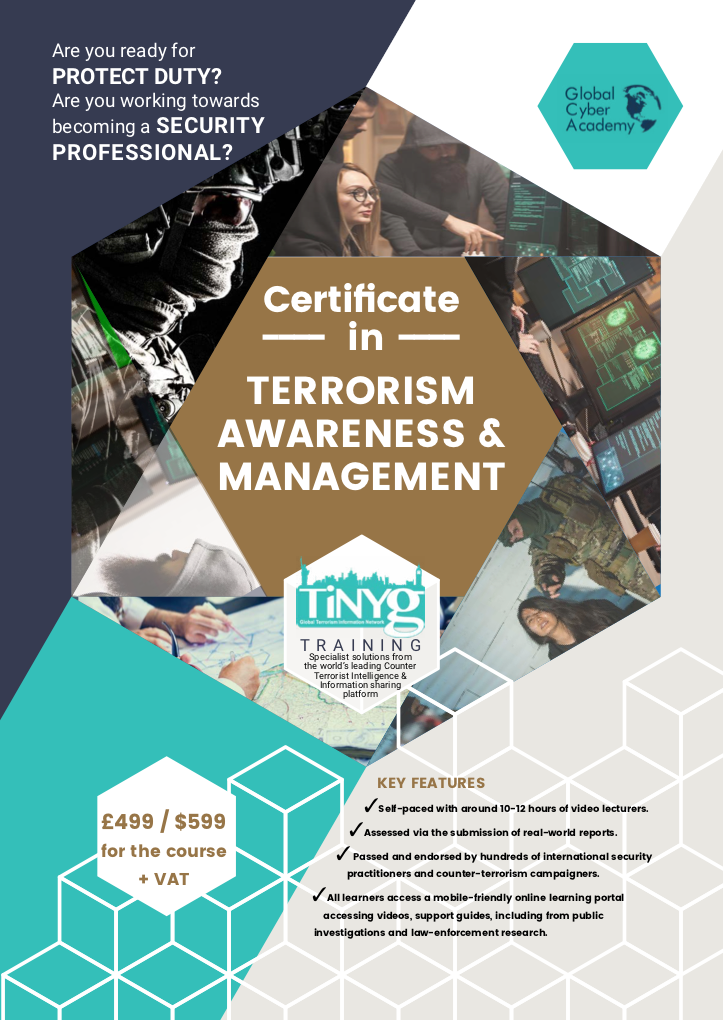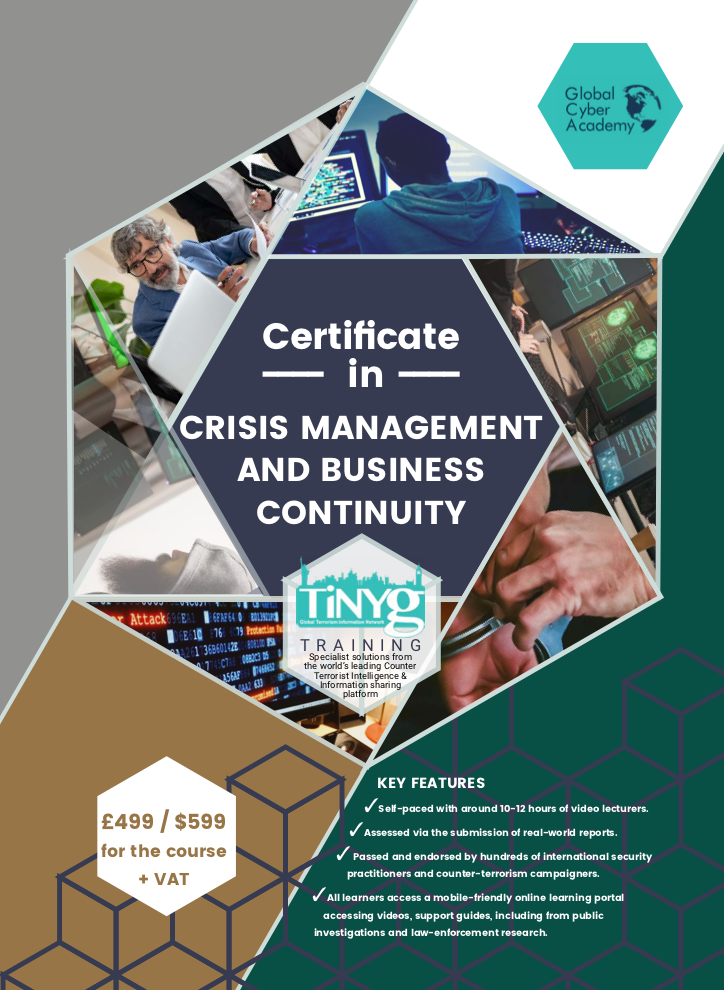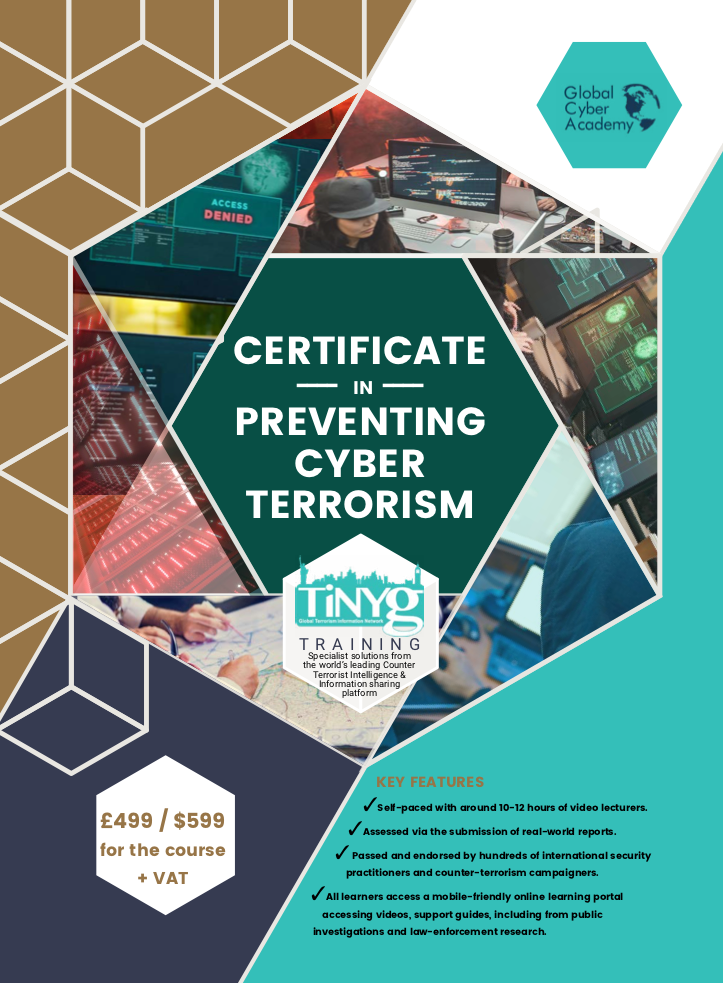TERRORISM AWARENESS & MANAGEMENT
CERTIFICATE IN TERRORISM AWARENESS & MANAGEMENT
Most man-made disasters & violent conflicts are preceded by incubation periods during which policy makers misinterpret, are ignorant of, or flat-out ignore repeated indications of impending danger.

KEY FEATURES
✓Self-paced with around 10-12 hours of video lecturers.
✓Assessed via the submission of real-world reports.
✓ Passed and endorsed by hundreds of international security practitioners and counter-terrorism campaigners.
✓All learners access a mobile-friendly online learning portal accessing videos, support guides, including from public investigations and law-enforcement research.
COURSE INSTRUCTOR
Richard Bingley FHEA PGCLTHE
Senior Instructor in Cybersecurity and Incident Management and author of the book ‘Combatting Cyber Terrorism’.

WHO IS THIS COURSE FOR?
This programme is designed for security and risk managers who are being tasked with the modelling, planning and management of security programmes that are robust enough to protect their communities not just from accidents and disasters, but from intentional attack.
More Details
COURSE MATERIAL INCLUDES:
- Introduction to the Fundamentals of Terrorism Awareness and Management
- Motivations of the terrorists
- Attack Methodologies
- Rational Choice Theory and Target Selection Process
- Psychosocial aspects
- Terrorist profiling
- Developing the Terrorism Management Risk Register
- Terrorism Management and Security Management: converged mitigation
- Developing The Programme: Integration & Collaboration
- Mapping A Response: The Terrorism Management Playbook
- Capability Development: Training, Exercising, Validation
- The Nightmare Scenario: Responding to a Terrorist Event
- Preparing For The Aftermath: Emergency Management vs Crisis Response
COURSE STRUCTURE
OWNERSHIP & ENGAGEMENT
Terrorism Awareness and Management is not something that can usually be out-sourced to a single team or department. The course seeks to discover, encourage and nurture the most effective management attitudes, approaches and capabilities that can assist counter-terrorism and security planning, without significantly disrupting the core business operations and strategies.
COMMUNICATION & INFORMATION EXCHANGE
The ability to gather information, create a structured understanding of the situation, and to share information across your networks (both internal and external), is one of the critical issues that effective preparation can significantly impact on.
EXECUTIVE TRAINING / EXERCISING / VALIDATION: A STRUCTURED PROCESS
Executive capability development is not something that happens overnight or without much prior planning and practice. It is usually the result of a well structured training and exercising programme and omnipotent, solid (yet) agile management and co-ordination across an entire organisation. Training and exercising is often not so much about teaching people to do something new, but more about providing attendees with a framework or plan which prompts them to make the correct decisions at the necessary time; usually under the greatest stress that they will ever face.
COURSE PROGRAMME
The course leads with five sections covering:
- Contemporary nature of terrorism – roots of terrorism; international terrorism and its evolution; case studies and typologies of method and motivation; People, Targets and Magnets; Laws, definitions and categorisation. Protect UK, Duty of Care legislation and ‘Martyn’s Law’.
- Profiling, decision-making and motivations – complex challenges and findings around profile and demographics; profile and motivations prior to 9/11; contemporary profiling of psychosocial characteristics of perpetrators; Lone Wolves, Group Settings and inbetweeners.
- Securing the Attack Surface – securing buildings with case study; securing personnel with case study; cyber security and case studies; Convergence and integrating physical, information systems and personnel security and working through the ISO 27001 Annex of physical security environment security controls.
- Business Continuity Planning and Impacts – BCP guidance and planning; policies, processes and implementation; adding ‘people’ into the plan; aligning BCP to holistic organisational resilience.
- Responding and Recovery – Crisis Management; Crisis Communications; Incident Response including Information Systems; Risk Frameworks and framing ‘risk’ appetite; Threat Intelligence and the ‘Intelligence Cycle’.
COST
£399/$499 + VAT
For information on dates and availability
Other courses...
Crisis Management and Business Continuity
Mishandling a crisis, incident response, or failing to prepare for an emergency, can permanently shut-down or bankrupt an organisation and/or lead to serious and highly-visible sanctions against company leaders.
Many organisational crises in business and public sector institutions begin with a series of small trigger incidents, which – taken together – can come to overwhelm an organization, sector, or nation, before senior-decision-makers are able to organise a response that can mitigate hazards and threats.


Combating Cyber Terrorism – Mitigation and Response
Quick and easy induction to cyber terrorism, taking 10 hours to complete via online webinars across one working week

Understanding terrorism by bringing together experts, in a trusted environment to increase awareness of threats & develop capabilities to prepare and respond.
